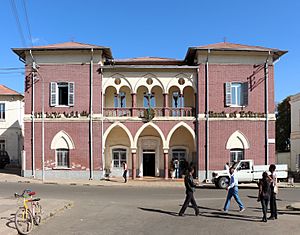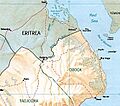Isaias Afwerki facts for kids
Quick facts for kids
Isaias Afwerki
|
|
|---|---|
| ኢሳይያስ ኣፍወርቂ | |
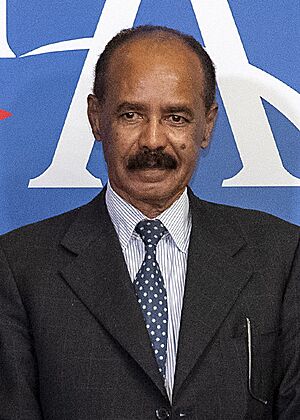
Isaias in 2024
|
|
| 1st President of Eritrea | |
| Assumed office 24 May 1993 |
|
| Preceded by | Office established |
| 1st President of the National Assembly of Eritrea | |
| Assumed office 24 May 1993 |
|
| Preceded by | Office established |
| 1st Chairman of the People's Front for Democracy and Justice | |
| Assumed office 16 February 1994 |
|
| Preceded by | Party established |
| 1st Secretary-General of the Provisional Government of Eritrea | |
| In office 27 April 1991 – 24 May 1993 |
|
| Preceded by | Office established |
| Succeeded by | Office abolished |
| 2nd Leader of the Eritrean People's Liberation Front | |
| In office 12 January 1987 – 16 February 1994 |
|
| Preceded by | Romodan Mohammed Nur |
| Succeeded by | Party dissolved |
| Personal details | |
| Born | 2 February 1946 Asmara, British Military Administration in Eritrea |
| Political party | People's Front for Democracy and Justice (since 1994) |
| Spouse | Saba Haile |
| Children | 3 |
| Education | Addis Ababa University (dropped out) |
| Signature |  |
| Military service | |
| Allegiance | ELF (1966–1969) EPLF (1970–1994) |
| Years of service | 1966–1991 |
| Battles/wars | Eritrean War of Independence Eritrean Civil Wars |
Isaias Afwerki (born February 2, 1946) is an Eritrean leader who has been the president of Eritrea since 1993. He is also the chairman of the country's only political party, the People's Front for Democracy and Justice (PFDJ).
As a young man, Isaias joined a group fighting for Eritrea's independence from Ethiopia. He became a key leader in the Eritrean People's Liberation Front (EPLF). This group led Eritrea to victory in 1991, ending a 30-year war. Two years later, Eritrea officially became a new country, and Isaias was elected its first president.
Many countries and organizations have criticized Isaias's leadership. They say he rules as a dictator because Eritrea has not had an election since he came to power. The country's constitution has not been put into effect. Groups like the United Nations and Amnesty International have reported serious human rights problems in Eritrea. In 2024, an organization called Reporters Without Borders ranked Eritrea last in the world for press freedom.
Contents
Early Life and Schooling
Isaias Afwerki was born on February 2, 1946, in Asmara, the capital of Eritrea. His father worked for a tobacco company, and his mother was a housewife.
Isaias grew up in Asmara and went to Prince Makonnen High School. There, he became interested in politics and the idea of an independent Eritrea. In 1965, he started studying engineering at a university in Addis Ababa, Ethiopia. However, he soon left his studies to join the fight for Eritrea's freedom.
The Fight for Independence
In 1966, Isaias joined the Eritrean Liberation Front (ELF), a group fighting for independence. He and his friends quickly realized the group was divided. They decided to form their own secret cell within the ELF. In 1967, Isaias went to China for training in military strategy.
When he returned, Isaias became a leader in the ELF. But disagreements grew, and in 1969, he and others left to form a new group. This group eventually became the Eritrean People's Liberation Front (EPLF) in 1973. Isaias became its leader.
The EPLF fought against both the Ethiopian army and other Eritrean rebel groups. By the 1980s, Isaias had become the main leader of the EPLF. He was seen as a symbol of the struggle for freedom. In May 1991, his forces captured Asmara and won the war. After the war, Isaias worked to get international support for Eritrea's independence.
Presidency and National Leadership
Becoming an Independent Nation
In April 1993, the people of Eritrea voted for independence in a referendum supervised by the United Nations. The following month, Eritrea was officially recognized as a new country. The National Assembly elected Isaias as the first president. He has held this position ever since.
In 1994, the EPLF changed its name to the People's Front for Democracy and Justice (PFDJ) to become a political party. Isaias was elected its leader. He started a national service program where citizens serve for 18 months, combining military training with work in farming and development.
How Eritrea is Governed
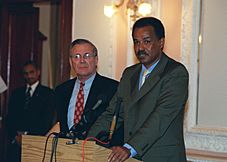
When Isaias first became president, some world leaders praised him. However, a new constitution written in 1997 was never put into action. National elections planned for 2001 were canceled and have not been held since. This means Isaias has remained in power without being re-elected.
In 2001, his government shut down all private newspapers. It also arrested many important opposition leaders. When asked in 2010 when elections might happen, he said to wait "3 or 4 decades." Many people, including some of his former allies, have said that he has gathered all the power for himself.
The Nation's Economy
Isaias has focused on building the country's infrastructure. This includes projects for power, transportation, and communication. The government has also worked on building basic healthcare and schools.
Eritrea's economy relies heavily on farming and mining. According to the World Bank, the country's economy has seen both growth and decline. After Eritrea re-established ties with Ethiopia in 2018, the economy was affected by changes in currency and trade.
Human Rights in Eritrea
International groups have raised serious concerns about human rights in Eritrea. Amnesty International has reported that thousands of political prisoners are held in the country. A United Nations report in 2015 accused Isaias's government of major human rights violations.
The government has banned independent newspapers since 2001. Journalists who criticize the government have been arrested. Human rights organizations are not allowed into Eritrea. They get their information from people who have left the country. Reports mention problems like forced labor, lack of free speech, and arrests without trial.
Foreign Relations
Relations with Ethiopia
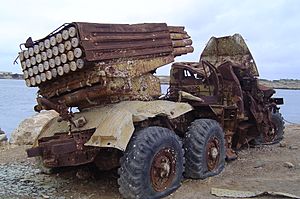
After independence, Eritrea's relationship with Ethiopia was difficult. From 1998 to 2000, the two countries fought a war over a border dispute. The war caused many deaths on both sides. A peace deal was signed in 2000, but the border issue was not fully resolved for many years.
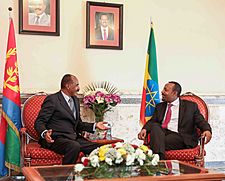
In 2018, things changed when Abiy Ahmed became Prime Minister of Ethiopia. He and Isaias signed a peace agreement, officially ending the conflict. They reopened borders and restored diplomatic and trade relations. This was seen as a major step toward peace in the region.
Later, in November 2020, conflict broke out in Ethiopia's Tigray Region. Eritrean soldiers joined the Ethiopian army to fight against the region's leaders. There were reports of widespread damage and looting. In 2021, after international pressure, it was announced that Eritrean troops would leave Tigray.
Relations with Other Countries
- Sudan: Relations with Sudan have been up and down. At first, they were hostile, but they improved after 2005. Eritrea helped create a peace agreement for eastern Sudan. The two countries have also agreed to work together on economic projects.
- Djibouti: Eritrea has had border conflicts with Djibouti. In 2008, their armies faced each other across the border, but they agreed to solve the issue through talks.
- Somalia: In 2018, Eritrea and Somalia re-established diplomatic relations after many years of poor relations.
- Russia:
Eritrea is one of the few countries that has supported Russia on the world stage. In 2022, it voted against a United Nations resolution that condemned Russia's invasion of Ukraine. Isaias has met with Russian President Vladimir Putin to strengthen ties between their countries.
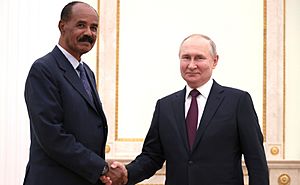 Isaias Afwerki with Russian President Vladimir Putin in Moscow, 2023.
Isaias Afwerki with Russian President Vladimir Putin in Moscow, 2023.
Personal Life
Isaias married Saba Haile in 1981. She was also a fighter in the EPLF. They have three children: Abraham, Elsa, and Berhane.
Just before Eritrea's independence, Isaias became very ill with malaria. He was flown to Israel for treatment and made a full recovery. He is a member of the Eritrean Orthodox Church.
His nickname is "Isu." His training in China made him an admirer of the former Chinese leader Mao Zedong.
Foreign Honours
 Saudi Arabia Order of King Abdulaziz (2018)
Saudi Arabia Order of King Abdulaziz (2018) Serbia Order of the Republic of Serbia, Second Class (2016)
Serbia Order of the Republic of Serbia, Second Class (2016) United Arab Emirates Order of Zayed, First Class (2018)
United Arab Emirates Order of Zayed, First Class (2018)
Images for kids
See also
 In Spanish: Isaias Afwerki para niños
In Spanish: Isaias Afwerki para niños
 | John T. Biggers |
 | Thomas Blackshear |
 | Mark Bradford |
 | Beverly Buchanan |


